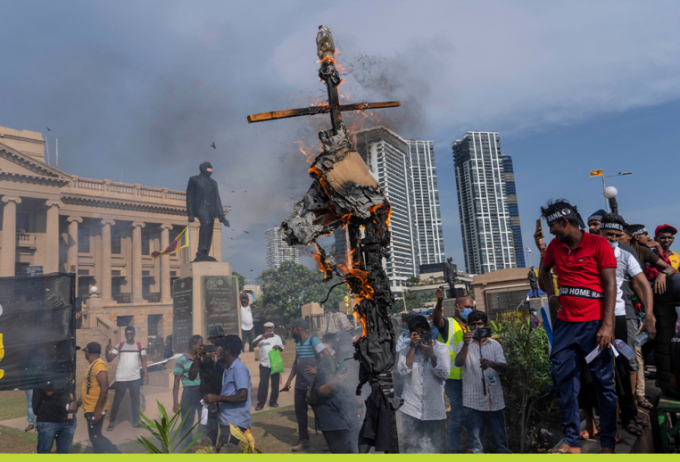November 27, 2025 | 18:48 GMT +7
November 27, 2025 | 18:48 GMT +7
Hotline: 0913.378.918
November 27, 2025 | 18:48 GMT +7
Hotline: 0913.378.918

Protestors burn an effigy of acting President and Prime Minister Ranil Wickremesinghe as they demand his resignation in Colombo, Sri Lanka. Photo: Rafiq Maqbool
The right and contrarian types are seizing on the country's banning of chemical fertilizers as the proximate culprit that led to President Gotabaya Rajapaksa turning over his palace to protesters last week.
The reality: It's complicated (as usual).
While Rajapaksa's abrupt ban on chemical fertilizers did jolt farmers, yields didn't fall so precipitously that it would have dented exports that much, says David LaBorde, a senior research fellow at the International Food Policy Research Institute.
The bigger issue is that Covid-19 sent droves of overseas workers home to Sri Lanka. Money sent home by Sri Lankans working abroad normally totals about $6 billion per year, well above the $1.2 billion that comes from tea, the country's largest cash crop.
"The remittances shock is several orders of magnitude bigger than the worst scenario we can imagine about tea," LaBorde said.
Without the remittances and tourism dollars, Sri Lanka had to spend more of its own currency on imports and interest on debt, which combined with inflation sent it into the spiral that led to its economic collapse.
"The thing that is pretty evident is that there was macroeconomic mismanagement in Sri Lanka for months, if not years," LaBorde said.
Rajapaksa also may not have been as "in thrall to green nostrums" as the WSJ alleges. He might have been using green rhetoric to justify a purely money-saving decision — which in turn was forced by the lack of income, LaBorde said. "They didn't want to spend their foreign currency on fertilizer," he said. "That was already a kind of reverse causality."
While the drop in yields and exports didn't cause the economic meltdown in Sri Lanka, it is extremely possible to go too far, too fast with organic farming. Focusing on going organic is too reductive: Take farms in Africa, where lack of access to fertilizer often leads to depleted soil.
"That's the kind of organic farming, because they don't use synthetic inputs, that destroys their long-term sustainability," LaBorde said. And there's a bigger picture: Forgoing larger yields in order to avoid conventional fertilizer just forces more land to be turned over to agriculture. "Instead of using fertilizer in Europe, you can get more deforestation in Brazil," he said.
"There is an inherent tension between food security goals and environmental goals with fertilizer," said Colin Christensen, global policy director for One Acre Fund, a nonprofit that supplies seeds, fertilizer, crop insurance and other services for small farmers in eastern and southern Africa. "We haven’t been able to feed 9 billion people on our planet without synthetic fertilizer."
How to keep Sri Lanka's example from inflaming Western fault lines?
More nuance when it comes to fertilizer, Christensen says: "Different regions of the world require different approaches: For example, U.S. and European farmers need to reduce overall use for environmental reasons, while African farmers deserve more access to it, to be used efficiently, so their kids don't go hungry."
"We should not draw any generalities or conclusions out of the Sri Lanka situation, except that bad macroeconomic policy can destroy your country and destroy your farm system," LaBorde said. "That's the only lesson I really want to draw about Sri Lanka."
(Politico; AP)

(VAN) A new study reveals how the simultaneous effects of ocean acidification, salinity and loss of oxygen are making the world more fragile.

(VAN) Hopes are growing that the creation of the first 3D turkey gut model could be a turning point in the battle against the virulent blackhead disease.

(VAN) Tyson, America’s biggest meat supplier, plans to shutter one of its largest beef processing plants as the industry continues to struggle with low cattle supplies and political pressure from Washington.

(VAN) New FAO study shows how digital solutions are empowering farmers and fishers to prevent losses and build resilient agrifood systems.

(VAN) Brazil's COP30 presidency pushed through a compromise climate deal on Saturday that would boost finance for poor nations coping with global warming but that omitted any mention of the fossil fuels driving it.

(VAN) Poultry farmers in the UK have been warned that they could face one of the worst winters yet for bird flu.

(VAN) Prices of main-crop paddy have risen sharply, with jasmine rice hitting 16,100 baht per tonne — the highest level in years.